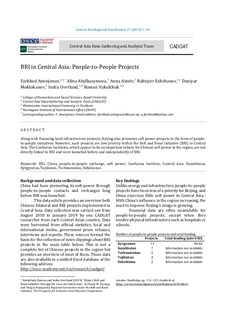| dc.contributor.author | Vakulchuk, Roman | |
| dc.contributor.author | Øverland, Indra | |
| dc.contributor.author | Aminjonov, Farkhod | |
| dc.contributor.author | Abylkasymova, Alina | |
| dc.contributor.author | Eshchanov, Bahtiyor | |
| dc.contributor.author | Moldokanov, Daniyar | |
| dc.date.accessioned | 2019-07-11T16:22:40Z | |
| dc.date.available | 2019-07-11T16:22:40Z | |
| dc.date.created | 2019-07-03T15:18:40Z | |
| dc.date.issued | 2019 | |
| dc.identifier.uri | http://hdl.handle.net/11250/2605061 | |
| dc.description.abstract | Along with financing hard infrastructure projects, Beijing also promotes soft power projects in the form of people-to-people initiatives. However, such projects are low priority within the Belt and Road Initiative (BRI)in Central Asia. The Confucius Institutes, which appear to be an important vehicle for Chinese soft power in the region, are not directly linked to BRI and were launched before and independently of BRI. | |
| dc.description.abstract | BRI in Central Asia: People-to-People Projects | |
| dc.language.iso | eng | nb_NO |
| dc.publisher | OSCE Academy / NUPI | nb_NO |
| dc.relation.ispartof | Central Asia Data-Gathering and Analysis Team (CADGAT) | |
| dc.relation.ispartofseries | Central Asia Data-Gathering and Analysis Team (CADGAT);27 | |
| dc.relation.uri | https://www.researchgate.net/publication/333673436_BRI_in_Central_Asia_People-to-People_Projects | |
| dc.rights | Navngivelse 4.0 Internasjonal | * |
| dc.rights.uri | http://creativecommons.org/licenses/by/4.0/deed.no | * |
| dc.title | BRI in Central Asia: People-to-People Projects | nb_NO |
| dc.type | Research report | nb_NO |
| dc.description.version | publishedVersion | |
| dc.source.pagenumber | 10 | nb_NO |
| dc.source.issue | 27 | nb_NO |
| dc.identifier.cristin | 1709882 | |
| cristin.unitcode | 7471,11,0,0 | |
| cristin.unitname | Russland, Eurasia og internasjonal handel | |
| cristin.ispublished | true | |
| cristin.fulltext | original | |

